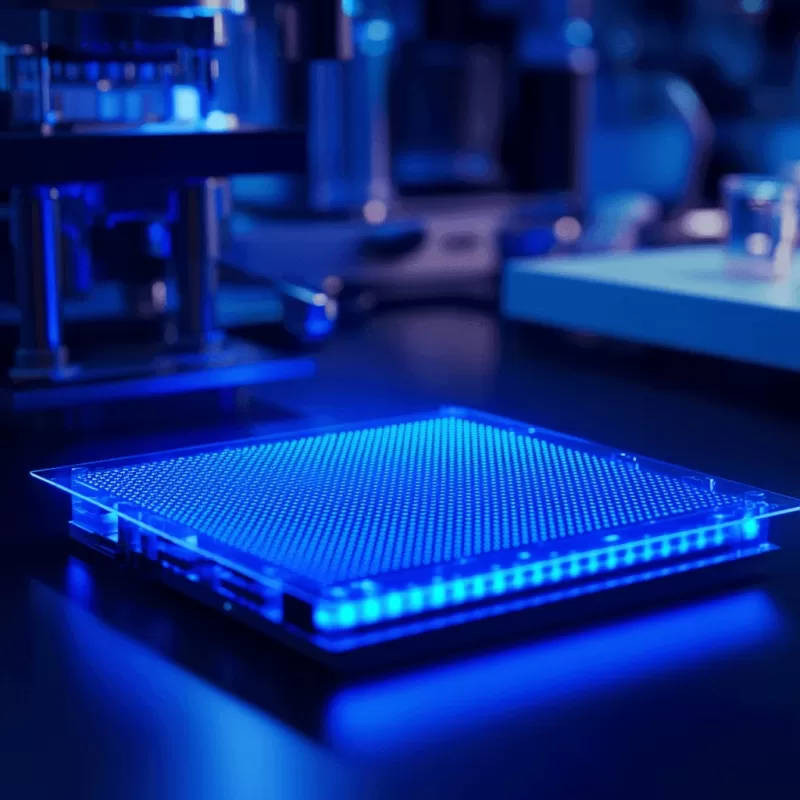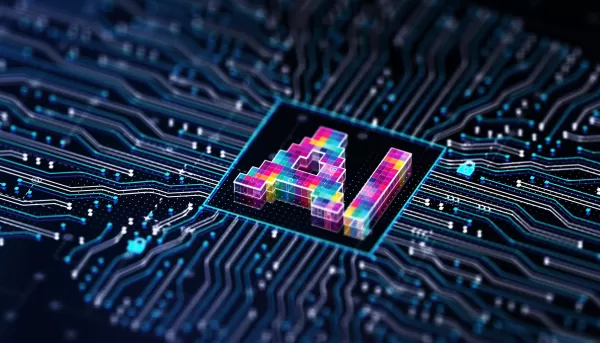Hyperlume Aims to Boost Chip-to-Chip Communication Efficiency

In 2023, data centers guzzled up 4.4% of the U.S.'s electricity, and experts predict that number could soar to 12% by 2028. Most of this energy is gobbled up just to move data from one chip to another. But there's a glimmer of hope on the horizon, and it's coming from a company called Hyperlume, based out of Ottawa, Canada. They're working on making this data transfer not only more energy-efficient but also faster.
Hyperlume has come up with a nifty version of microLEDs that can zip information around faster than the copper connections you usually see between data center racks. Plus, these microLEDs don't need as much power to get the job done as those copper wires.
Mohsen Asad, Hyperlume's co-founder and CEO, told TechCrunch that starting the company was a "logical extension" of the work he and his co-founder Hossein Fariborzi were already doing. Asad, with his background in electrical engineering, has spent his career trying to figure out better ways to move data between chips and racks. Fariborzi, on the other hand, knows his stuff when it comes to designing low-power electrical circuits.
Asad explained, "I was working on microLEDs, I was working in data transfer, and this boom of AI and the requirements for sending information from chip to chip, power consumption—all these things came together naturally. We found a huge market opportunity."
The rise of AI, moving at a breakneck pace, has made energy consumption and latency even bigger headaches for data centers, according to Asad. But solving the latency issue—basically, the delay in data transfer—could speed up existing chip connections and unlock chip capacity that was previously out of reach due to these bottlenecks.
"If we can solve this latency issue practically, we make [chips] work faster together," Asad said. "When you have large language models [...] you need the chips to communicate with almost zero latency."
When Asad and Fariborzi kicked off Hyperlume in 2022, they started brainstorming how to tackle the data center latency problem using existing tech. Silicon was an option, but way too pricey for widespread use. Lasers? Also too expensive.
So, they decided to take affordable microLEDs and tweak them to transfer data super quickly between chips, kind of like what a fiber optic connection can do, but without the hefty price tag.
"The secret sauce is ultra-fast microLEDs and on the other side a low-power ASIC that drives everything and communicates with other chips," Asad revealed.
Right now, Hyperlume is working with a few early customers, mostly in North America, to fine-tune their product. They've been getting a lot of interest, especially from hyperscalers, as well as cable manufacturers and other industries that could use their tech.
"The first stage for us is to work with those early adopters—as soon as the technology is proven and goes inside of data centers with those early adopters, it's going to give us a chance to scale to work with the rest of the market," Asad said. "The demand is there and is growing and growing every year."
Hyperlume recently scored a $12.5 million seed round, led by BDC Capital's Deep Tech Venture Fund and ArcTern Ventures, with MUUS Climate Partners, Intel Capital, and SOSV among the other investors.
This fresh cash will help them hire more engineers and keep developing their tech, hopefully getting it into the hands of more customers soon. Looking ahead, Hyperlume wants to ramp up its bandwidth to be ready for the next wave of powerful data centers.
"Right now we are focused on optical connections, to connect chips together, to connect boards together, but the way that we see the company growing is that it is going to be an AI connectivity solution provider," Asad said.
Related article
 Two Charged in Scheme to Illegally Export AI Chips to China
The U.S. Department of Justice (DOJ) announced Tuesday that two Chinese nationals were apprehended for allegedly orchestrating the illegal export of high-performance AI chips, valued at tens of millio
Two Charged in Scheme to Illegally Export AI Chips to China
The U.S. Department of Justice (DOJ) announced Tuesday that two Chinese nationals were apprehended for allegedly orchestrating the illegal export of high-performance AI chips, valued at tens of millio
 Oracle's $40B Nvidia Chip Investment Boosts Texas AI Data Center
Oracle is set to invest approximately $40 billion in Nvidia chips to power a major new data center in Texas, developed by OpenAI, as reported by the Financial Times. This deal, one of the largest chip
Oracle's $40B Nvidia Chip Investment Boosts Texas AI Data Center
Oracle is set to invest approximately $40 billion in Nvidia chips to power a major new data center in Texas, developed by OpenAI, as reported by the Financial Times. This deal, one of the largest chip
 Cognichip Unveils AI-Driven Chip Development to Accelerate Semiconductor Innovation
Chips are vital to the AI industry, yet their development lags behind the rapid pace of new AI models and products.Cognichip aims to revolutionize chip design with a foundational AI model to expedite
Comments (56)
0/200
Cognichip Unveils AI-Driven Chip Development to Accelerate Semiconductor Innovation
Chips are vital to the AI industry, yet their development lags behind the rapid pace of new AI models and products.Cognichip aims to revolutionize chip design with a foundational AI model to expedite
Comments (56)
0/200
![BruceMiller]() BruceMiller
BruceMiller
 September 19, 2025 at 6:30:30 PM EDT
September 19, 2025 at 6:30:30 PM EDT
Hyperlume pourrait être la solution qu'on attendait pour réduire la consommation énergétique des data centers. 🍃 Mais est-ce que leur technologie sera compatible avec les infrastructures existantes ? J'ai hâte de voir les premiers résultats concrets !


 0
0
![DavidGonzalez]() DavidGonzalez
DavidGonzalez
 August 25, 2025 at 3:01:23 PM EDT
August 25, 2025 at 3:01:23 PM EDT
Wow, Hyperlume's tech sounds like a game-changer for chip communication! If they can slash data center energy use, that’s huge for sustainability. Anyone know how their approach compares to traditional methods? 🤔


 0
0
![SamuelWilson]() SamuelWilson
SamuelWilson
 August 16, 2025 at 9:00:59 PM EDT
August 16, 2025 at 9:00:59 PM EDT
Hyperlume's tech sounds like a game-changer for data centers! 🚀 Cutting energy use while speeding up chip communication is huge, especially with AI's crazy demands. Curious how fast they can scale this!


 0
0
![ChristopherThomas]() ChristopherThomas
ChristopherThomas
 August 2, 2025 at 11:07:14 AM EDT
August 2, 2025 at 11:07:14 AM EDT
Hyperlume's tech sounds like a game-changer for data centers! Cutting energy use for chip communication? That’s huge for sustainability. 🤯 Curious how it stacks up against current solutions.


 0
0
![GeorgeKing]() GeorgeKing
GeorgeKing
 July 30, 2025 at 9:41:20 PM EDT
July 30, 2025 at 9:41:20 PM EDT
Hyperlume’s tech sounds like a game-changer for data centers! Cutting down energy waste in chip communication is huge—imagine the cost savings and eco benefits. Anyone know how soon this could hit the market? 🤔


 0
0
![CharlesHernández]() CharlesHernández
CharlesHernández
 July 27, 2025 at 9:19:05 PM EDT
July 27, 2025 at 9:19:05 PM EDT
This Hyperlume stuff sounds like a game-changer for data centers! 😮 If they can really cut down on chip-to-chip power waste, that’s huge for efficiency. Wonder how it stacks up against other tech out there?


 0
0

 Two Charged in Scheme to Illegally Export AI Chips to China
The U.S. Department of Justice (DOJ) announced Tuesday that two Chinese nationals were apprehended for allegedly orchestrating the illegal export of high-performance AI chips, valued at tens of millio
Two Charged in Scheme to Illegally Export AI Chips to China
The U.S. Department of Justice (DOJ) announced Tuesday that two Chinese nationals were apprehended for allegedly orchestrating the illegal export of high-performance AI chips, valued at tens of millio
 Cognichip Unveils AI-Driven Chip Development to Accelerate Semiconductor Innovation
Chips are vital to the AI industry, yet their development lags behind the rapid pace of new AI models and products.Cognichip aims to revolutionize chip design with a foundational AI model to expedite
Cognichip Unveils AI-Driven Chip Development to Accelerate Semiconductor Innovation
Chips are vital to the AI industry, yet their development lags behind the rapid pace of new AI models and products.Cognichip aims to revolutionize chip design with a foundational AI model to expedite
 September 19, 2025 at 6:30:30 PM EDT
September 19, 2025 at 6:30:30 PM EDT
Hyperlume pourrait être la solution qu'on attendait pour réduire la consommation énergétique des data centers. 🍃 Mais est-ce que leur technologie sera compatible avec les infrastructures existantes ? J'ai hâte de voir les premiers résultats concrets !


 0
0
 August 25, 2025 at 3:01:23 PM EDT
August 25, 2025 at 3:01:23 PM EDT
Wow, Hyperlume's tech sounds like a game-changer for chip communication! If they can slash data center energy use, that’s huge for sustainability. Anyone know how their approach compares to traditional methods? 🤔


 0
0
 August 16, 2025 at 9:00:59 PM EDT
August 16, 2025 at 9:00:59 PM EDT
Hyperlume's tech sounds like a game-changer for data centers! 🚀 Cutting energy use while speeding up chip communication is huge, especially with AI's crazy demands. Curious how fast they can scale this!


 0
0
 August 2, 2025 at 11:07:14 AM EDT
August 2, 2025 at 11:07:14 AM EDT
Hyperlume's tech sounds like a game-changer for data centers! Cutting energy use for chip communication? That’s huge for sustainability. 🤯 Curious how it stacks up against current solutions.


 0
0
 July 30, 2025 at 9:41:20 PM EDT
July 30, 2025 at 9:41:20 PM EDT
Hyperlume’s tech sounds like a game-changer for data centers! Cutting down energy waste in chip communication is huge—imagine the cost savings and eco benefits. Anyone know how soon this could hit the market? 🤔


 0
0
 July 27, 2025 at 9:19:05 PM EDT
July 27, 2025 at 9:19:05 PM EDT
This Hyperlume stuff sounds like a game-changer for data centers! 😮 If they can really cut down on chip-to-chip power waste, that’s huge for efficiency. Wonder how it stacks up against other tech out there?


 0
0





























